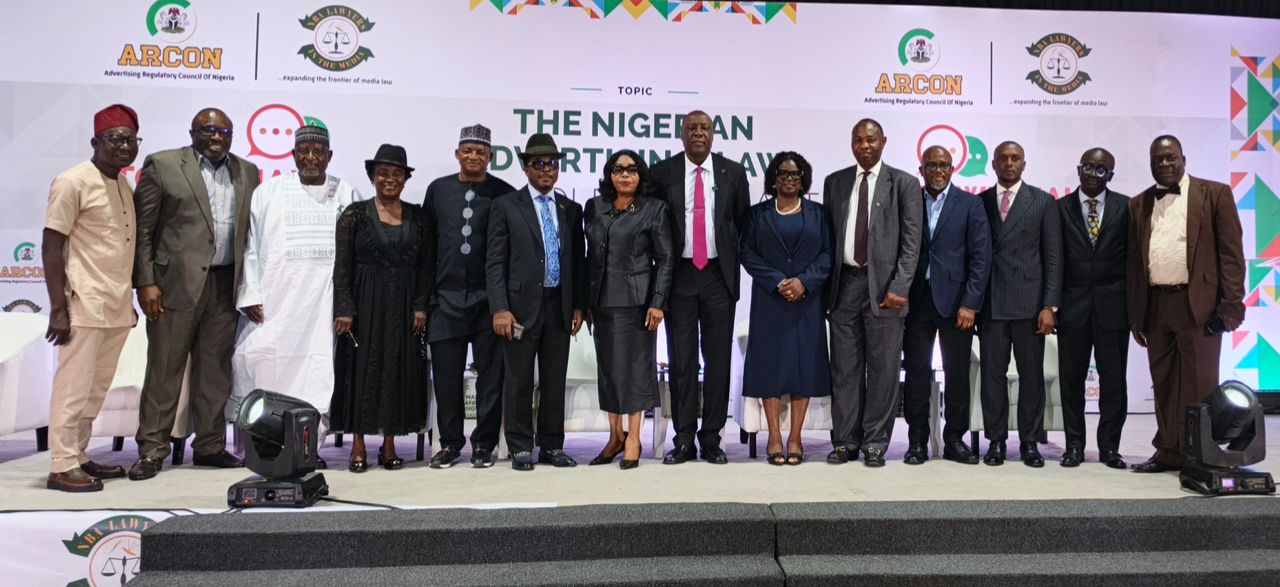In response to growing concerns and questions about the authority of the Advertising Offences Tribunal (AOT) to regulate the advertising industry and sanction violations of advertising laws, the Advertising Regulatory Council of Nigeria (ARCON), in collaboration with the Nigerian Bar Association (NBA) and NBA Lawyers in the Media, organized a Town Hall Meeting to clarify the tribunal’s legal mandate and its role in adjudicating advertising-related offenses.
Conversations on Compliance and Creative Freedom
The discussions at the forum centered on pressing challenges such as the lack of understanding of relevant advertising laws, the evolving impact of artificial intelligence (AI) on advertisements, and finding a harmonious balance between necessary regulation and the freedom for creative expression.
At the event, held at Sheba Event Centre, panelists emphasised that involving legal experts early in the planning phases of advertising campaigns is critical to ensuring compliance and avoiding costly legal issues later on.
Furthermore, they highlighted that proactive legal engagement strengthens brand protection and supports adherence to Nigeria’s advertising codes and standards.
Tribunal’s Purpose and Ethical Commitment
On her part, Justice Cecilia Olatoregun (retd), the Chairman of the AOT, emphasized that the tribunal was created to ensure compliance, uphold ethical standards, and address the rising issues of misinformation and regulatory breaches in advertising.
She pointed out that “Nigeria’s advertising industry has grown beyond traditional media into a variety of digital platforms, highlighting the need for stronger oversight and a more unified regulatory framework.”
A Groundbreaking Initiative
Senior Advocate of Nigeria, Chief Akinlolu Kehinde, Principal Counsel, Akinlolu Kehinde & Co., represented by Barrister Leke Kehinde, referred to the Advertising Offences Tribunal as “A groundbreaking initiative aimed at ensuring ethical practices in the advertising industry.”
He shared that the tribunal was set up to tackle some pressing issues in the industry like gaps in jurisdiction, weak enforcement, lengthy legal battles, and a lack of specialized knowledge when it comes to resolving disputes related to advertising.
“The tribunal has played a key role in enhancing the culture of compliance, encouraging fair competition, and discouraging misleading ads that could negatively impact consumers.”
ARCON’s Clarification on Roles
During the panel discussion, Dr. Olalekan Fadolapo, Director General, ARCON, clarified the role of members of the AOT, noting that ARCON does not vet adverts but regulates and ensures compliance.
“An important component of the regulatory framework is the Advertising Standards Panel (ASP), a multi-sectoral body that includes representatives from government agencies such as the Central Bank of Nigeria (CBN), Securities and Exchange Commission (SEC), and the National Agency for Food and Drug Administration and Control (NAFDAC).
“The purpose is to bring everybody into a clearing room so that we don’t have multiple regulation of advertising. ARCON only provides the secretariat for the ASP.”
He reaffirmed that “The ASP vets all advertising materials before public exposure, signifying a preventive rather than reactive approach to regulation.
This model allows Nigeria to avoid repeated damage control by catching potentially harmful content early.”
Legal and Constitutional Backing
The Advertising Offences Tribunal (AOT) operates within a clearly defined constitutional framework, as affirmed by Nigeria’s highest courts.
Barrister Charles Odenigbo, Director-General of the Centre for Media Law and Development, underscored that “the Supreme Court has long settled the issue of whether such bodies are validly constituted,” referencing Section 6(5)(j) of the Constitution which empowers the National Assembly to create tribunals that are distinct from regular courts.
He further emphasized that “Section 58(3) of the Act grants supervisory jurisdiction to the Federal High Court, ensuring procedural harmony and preventing jurisdictional conflicts.
This legal foundation removes doubts about the tribunal’s authority, rendering challenges to its jurisdiction as often based on misunderstanding rather than substantive legal flaws.”
The Tribunal’s Defined Powers
Bar. Odenigbo pointed out that the AOT’s powers are articulated explicitly in Section 37 of the Advertising Regulatory Council of Nigeria Act, which grants the tribunal exclusive authority to adjudicate and impose sanctions on advertising offences.
The appellate path is also streamlined, with Section 43 directing any appeal from the tribunal’s decisions directly to the Court of Appeal, eliminating confusion and inter-agency disputes.
Nigeria’s Unique Regulatory Ecosystem
Lanre Adisa, Chairman of the Heads of Advertising Sectoral Groups (HASG), highlighted the unique nature of Nigeria’s advertising ecosystem, shaped by its complex social and regulatory background.
“While many countries adopt self-regulation in advertising, Nigeria is in an evolutionary phase, working toward a system where compliance with self-regulatory standards is achievable,” he said.
He emphasized the industry’s challenge: ‘How do I stay creative within the ambit of the law without running afoul of that law?’
This reflects a broader concern about balancing regulation and creative freedom, particularly as many advertisers lack adequate awareness of the legal framework.”
Balancing Regulation and Innovation
Adisa specifically focused on the digital advertising space, acknowledging that its rapid growth outpaces regulatory capacity. Consequently, he advocated for a careful equilibrium between necessary regulation and technological innovation to maintain efficiency without stifling creativity.
He noted ongoing efforts with ARCON to address these challenges: “We are always in conversation saying ‘How can we ease this?’”
His vision includes employing new technologies such as AI to fast-track vetting processes.
Also, helping practitioners maintain compliance while fostering innovation, thereby ensuring “a very well-functioning ecosystem” for Nigeria’s vibrant advertising industry.






Comment
No comments found.